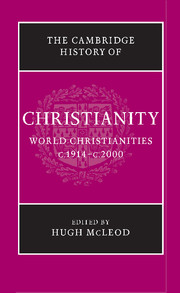1 - Introduction
Published online by Cambridge University Press: 28 March 2008
Summary
At the beginning of the twentieth century it is estimated that about a third of the people in the world were Christians – which meant that Christianity was by far the largest of the world’s religions. During the century the numbers of Christians increased rapidly, but so of course did the world’s population, with the result that the proportion who were Christians may have fallen slightly. By the end of the century Christians still outnumbered the followers of any other religion, but Muslims were a strong second. Meanwhile, there had been a dramatic shift in the distribution of Christians between the different regions of the world. It has been estimated that at the beginning of the twentieth century about 80 per cent of the world’s Christians lived in Europe, the Russian empire and North America, and a mere 5 per cent in Asia and Africa. By 2000, according to the same authors, the proportion living in Europe, the former Soviet Union and North America had dropped to around 40 per cent, while the proportion living in Asia and Africa had jumped to 32 per cent.
These figures neatly summarise two of the central themes of this volume: in the twentieth century Christianity became a worldwide religion; yet at the same time it suffered a series of major crises in what had been for many centuries its heartlands. Nonetheless, these familiar points may conceal two others, which are equally important.
- Type
- Chapter
- Information
- The Cambridge History of Christianity , pp. 1 - 14Publisher: Cambridge University PressPrint publication year: 2006
References
- 2
- Cited by



